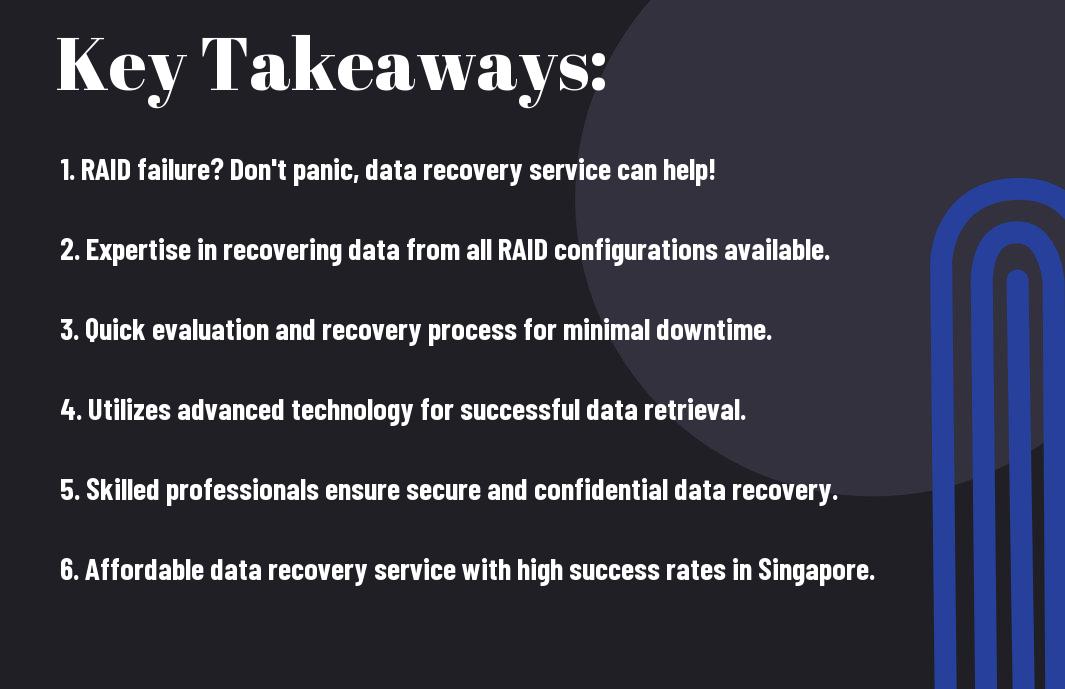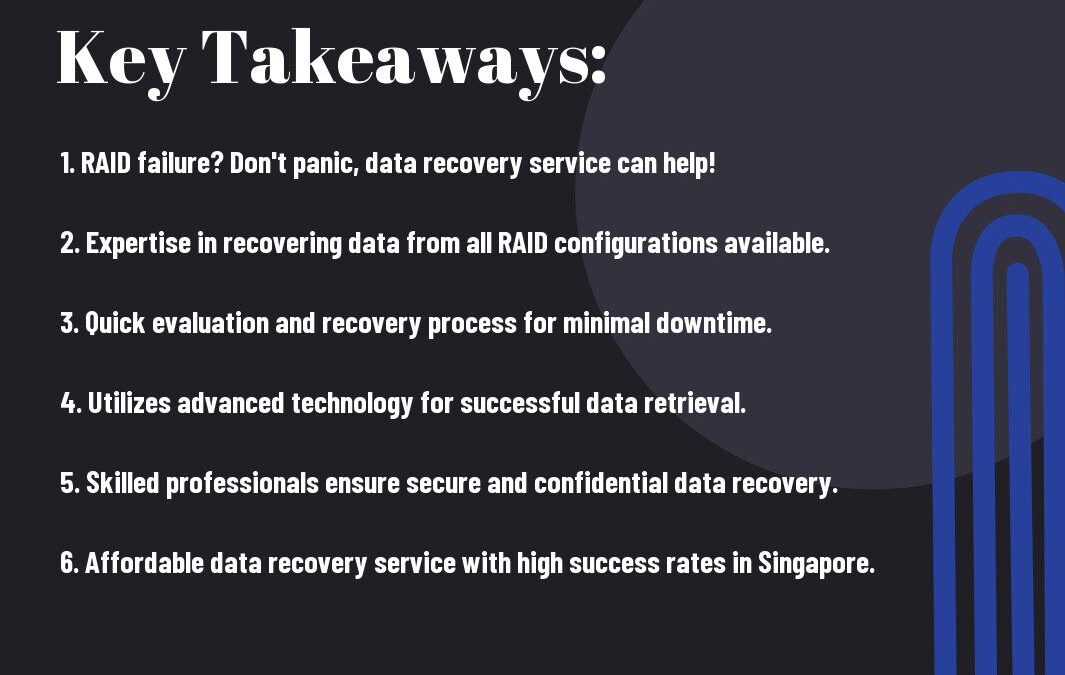With the increasing reliance on digital data storage in today’s world, experiencing RAID failure can be catastrophic for individuals and businesses alike. The loss of important data due to RAID failure can lead to significant disruptions in operations and financial losses. However, in Singapore, there is a critical solution at hand – Data Recovery Service. These specialized services offer expertise in recovering data from failed RAID systems, ensuring that valuable information is restored and protected. When facing the threat of RAID failure, turning to a reputable data recovery service in Singapore can be the difference between data loss and data restoration.

Common RAID Failures
Hardware Malfunction
One common cause of RAID failure is hardware malfunction. This could be due to issues with the hard drives, RAID controller, power supply, or other physical components. When hardware fails, it can lead to data loss and inaccessibility of the RAID array. It is crucial to address hardware problems promptly to avoid further damage to the data.
Software Corruption
With software corruption, the RAID array’s data structures or file system can become corrupted, leading to data loss or inaccessibility. It can be caused by software bugs, improper shutdowns, or malware. Software corruption is a dangerous issue as it can result in complete data loss if not addressed promptly and properly.
It is vital to have a backup of your data to minimize the impact of software corruption. Regularly monitoring the health of your RAID array and implementing proper data recovery procedures can help prevent and recover from software corruption.
Signs and Symptoms of RAID Failure
Identifying Red Flags
If you notice unusual sounds coming from your RAID system, such as clicking or grinding noises, this could indicate a hardware failure. Another red flag is if the system suddenly becomes sluggish, freezing, or crashing frequently. These signs should not be ignored as they could be early warnings of a RAID failure.
Prevention and Early Detection
To prevent RAID failure, it is crucial to regularly monitor the health of your system through diagnostic tools. Implementing a proactive approach by conducting routine system checks and ensuring proper ventilation for the hardware can help prevent potential failures. Early detection of issues can significantly increase the chances of data recovery.
Symptoms of RAID failure can manifest in various ways, including data corruption, inaccessible drives, or even complete system failure. With proper maintenance and timely intervention, you can minimize the risk of a RAID failure and safeguard your data.
Data Recovery Services in Singapore
Choosing the Right Data Recovery Service
After experiencing a RAID failure, choosing the right data recovery service is crucial to ensure the safe and successful retrieval of your valuable data. Look for a reputable company in Singapore with a proven track record of success, advanced technology, and experienced technicians. Consider factors such as turnaround time, pricing, and customer reviews before making your decision.
The Recovery Process Explained
Recovery of data from a failed RAID system involves a series of meticulous steps. The data recovery service will first assess the extent of the damage and determine the best course of action to retrieve the data. This process may include repairing damaged drives, extracting data from them, and reconstructing the RAID array to recover all lost files.
Singapore is home to several reputable data recovery services that specialize in handling RAID failures. These companies have state-of-the-art equipment and specialized expertise in recovering data from complex RAID configurations. With their thorough understanding of RAID systems and data recovery techniques, they can effectively restore your lost data and minimize the impact of the failure on your business.
Preparing for Potential RAID Failures
Regular Maintenance Tips
Now, to prevent potential RAID failures, regular maintenance is key. This involves checking the status of your RAID array on a consistent basis to detect any early signs of trouble. It is crucial to ensure that all hardware components are functioning properly and that the data is being backed up effectively.
- Regularly check the health of your RAID array by monitoring the SMART status of your hard drives.
- Keep your RAID controller firmware up to date to ensure compatibility and performance.
- Replace faulty drives immediately to prevent further data loss.
Though maintenance may seem tedious, these simple tasks can ultimately save you from the headache of dealing with a potential RAID failure. Thou, investing time in regular maintenance is a proactive measure that can prevent catastrophic data loss.
Backup Strategies and Best Practices
To prepare for potential RAID failures, it is crucial to have effective backup strategies in place. This involves regularly backing up your data to an external storage device or cloud service. In the event of a RAID failure, having a recent backup ensures that your data can be recovered without significant losses.
Final Thoughts on RAID Recovery
The Value of Professional Assistance
Once again, when facing RAID failure and data loss, seeking professional assistance from a reputable data recovery service in Singapore is crucial. The expertise and specialized tools that professionals bring to the table can greatly increase the chances of successful recovery and prevent further damage to your valuable data.
Looking Ahead: Securing Your Data for the Future
The value of data in today’s digital age cannot be overstated. As you recover from a RAID failure, it’s vital to take proactive measures to secure your data for the future. Implementing regular backups, investing in reliable storage solutions, and keeping your systems up to date with the latest security measures can help prevent similar data loss incidents in the future.
FAQ
Q: What is RAID Failure?
A: RAID (Redundant Array of Independent Disks) Failure occurs when one or more hard drives in a RAID array stop functioning properly, resulting in data loss or inaccessibility.
Q: What are the common causes of RAID Failure?
A: Common causes of RAID Failure include physical damage to hard drives, power surges, software corruption, and human error. It is crucial to address these issues promptly to prevent further data loss.
Q: How can Data Recovery Service In Singapore help with RAID Failure?
A: Data Recovery Service In Singapore utilizes advanced technology and expertise to recover data from failed RAID arrays. Our proven methods and experienced technicians ensure the highest chances of successful data recovery, minimizing downtime and restoring your valuable data.

